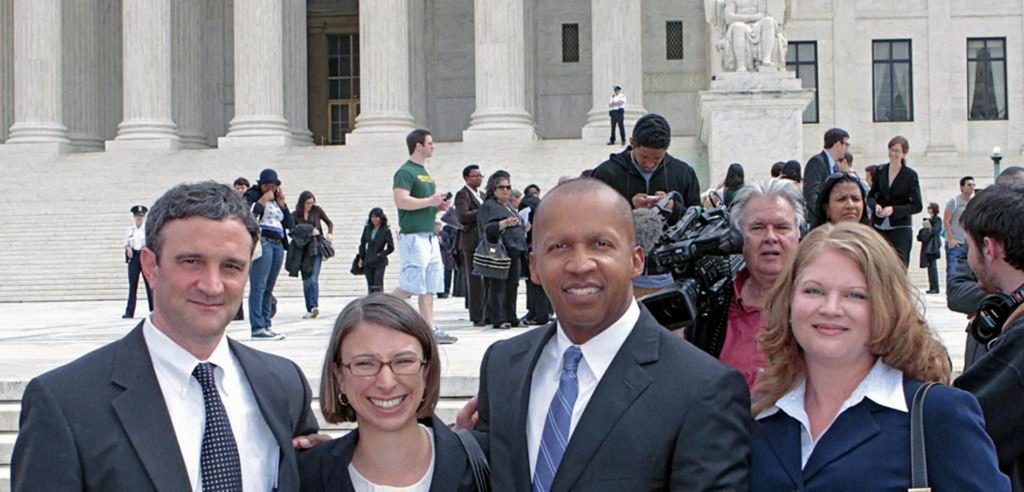Miller v. Alabama
EJI won a landmark ruling from the Supreme Court striking down mandatory death-in-prison sentences for children.

The United States Supreme Court on June 25, 2012, issued a historic ruling in Miller v. Alabama and its companion case, Jackson v. Hobbs, holding that mandatory life-without-parole sentences for all children 17 or younger convicted of homicide are unconstitutional. Kuntrell Jackson and Evan Miller, sentenced to life in prison without parole at 14, are now entitled to new sentencing hearings. The ruling will affect hundreds of individuals whose sentences did not take their age or other mitigating factors into account.
The Court struck down statutes in 29 states that provide for mandatory life-without-parole sentences for children, reasoning that mandatory imposition of life-without-parole sentences on children “contravenes Graham’s (and also Roper’s) foundational principle: that imposition of a State’s most severe penalties on juvenile offenders cannot proceed as though they were not children.”
“This is an important win for children. The Court took a significant step forward by recognizing the fundamental unfairness of mandatory death-in-prison sentences that don’t allow sentencers to consider the unique status of children and their potential for change,” said Bryan Stevenson, Executive Director of the Equal Justice Initiative, who represents Jackson and Miller. “The Court has recognized that children need additional attention and protection in the criminal justice system.”
The Miller v. Alabama decision requires the lower courts to conduct new sentencing hearings where judges will have to consider children’s individual characters and life circumstances, including age, as well as the circumstances of the crime.
While the Court did not categorically ban juvenile life without parole in all circumstances, Justice Kagan wrote for the majority that, “given all that we have said in Roper, Graham, and this decision about children’s diminished culpability, and heightened capacity for change, we think appropriate occasions for sentencing juveniles to this harshest possible penalty will be uncommon.”
Stevenson cautioned, however, that sentencing courts’ discretion must be exercised in an informed and thoughtful way that acknowledges that children are biologically different than adults and less responsible for their wrongdoing, and that the courts should provide the individuals affected by the ruling a meaningful opportunity to show they have rehabilitated themselves and are appropriate candidates for release.
Stevenson added that historically, race and poverty have been powerful forces in influencing which children receive life-without-parole sentences.
The decision follows the Court’s earlier rulings in Roper v. Simmons (2005) and Graham v. Florida (2010), which acknowledge the diminished culpability of children.
Groups as diverse as the American Psychological Association, the American Academy of Child and Adolescent Psychiatry, the American Psychiatric Association, the Council of Juvenile Correctional Administrators, the American Bar Association, mental health professionals, former juvenile court judges, criminologists, victims, and national advocacy organizations filed amicus briefs in the cases to urge the Court to give children an opportunity to have their sentences reviewed later in life.
Some states refused to apply Miller to older cases. On January 25, 2016, the Supreme Court held in Montgomery v. Louisiana that Miller applies retroactively and requires new sentencing hearings for everyone serving a mandatory life-without-parole sentence for an offense when they were under 18. Montgomery reaffirmed that life-without-parole sentences are unconstitutional for all but the rare juvenile for whom rehabilitation is impossible.
Over a thousand people who were automatically condemned to die in prison for juvenile offenses have been resentenced because of Miller, and hundreds have been released.